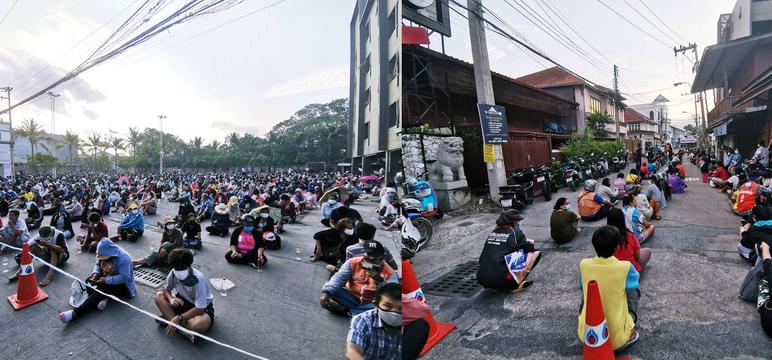The devastating effects of the covid-19 on the poorest Thai families
In April 2020, the Thai government decided to borrow 1,000 billion baht (27 billion euros) to finance public health, social protection and tax policy to relaunch the economy.
But according to a survey carried out by the World Bank, 80 % of low-income households recorded a drop in their resources with the COVVI-19 pandemic.
The results of this survey demonstrate the devastating consequences of the COVID-19 crisis in Thailand, especially on the poorest households: 60 % of low-income households lack food and 40 % said they are hungry.
70% of households recorded a drop in their income
The survey indicates that more than 70 percent of households experienced a drop in their income.Despite the increase in the number of jobs in rural areas, households in rural areas and low -income groups have declared that 80 percent of them experienced a drop in their income.
About half of the people working in agricultural and non -agricultural businesses have lost more than half of their income.This reduction in income has almost doubled the proportion of social assistance beneficiaries in 2020 compared to 2019, covering more than 80 % of households.
The Thai government has introduced the "Let’s Go Halves" co-payment program for non-agricultural companies, where buyers pay only 50 % for products from sellers and participating retailers.
As for agricultural households, they benefited from the "No One Left Behind" program, affecting 80 percent of them, which provided monthly monetary transfers to informal or independent workers, and the similar program of aid to farmers, coveringmore than 63 percent of them.
Vulnerable groups support a disproportionate burden.

While the fourth wave of Covid-19 struck Thailand in 2021, the resumption within vulnerable groups slowed down and supported a disproportionate burden.National employment has remained at a stable level of 68% since the start of the pandemic, although there have been variations between regions and population groups.
While employment in urban areas has decreased, it has increased in rural areas, because people who have lost their jobs in cities have returned to work in agriculture.
Fifty percent of the respondents' jobs were interrupted due to COVVI-19, ranging from job losses to a reduction in the number of working hours and a drop in wages.This has significantly affected individuals in low -income households, women, individuals in groups at low level of education and those in the southern.Married women and people with children have also been overwhelmed with treatment tasks during the pandemic.
Still slow vaccination rates
Although half of the respondents indicated that there was a COVVI-19 test center in their community, access and use of these test centers are still limited because only 16% of respondents were tested.
Most people know and know that there is a covid-19 vaccine and know where to get it, however, vaccination rates are still slow.In addition, hesitation in vaccination is raised among groups with low education and low income, as well as in young people.This hesitation is motivated by the concern of the side effects of vaccines.
A challenge for children's education
The pandemic continues to be a challenge for the education of children.Ninety percent households had school-aged children who attended the Last Semester school, half of whom in hybrid mode and a quarter in person.It is important to note that the proportions were lower in rural and low -income households, and those of the South.
Households have cited concerns about contamination by the virus, lack of financial means and lack of school preparation among the main reasons for not sending their children to school.More than half of households have reported that children encountered learning difficulties during these periods due to the inability to concentrate without the supervision of an adult and the lack of access to the learning devices.
In addition, given that learning devices and internet connection play an important role in distance learning, children of low -income and rural households can be faced with greater educational challenges.This negative effect on human capital can contribute to long -term poverty and inequalities.
Faced with the challenges posed by the pandemic, an inclusive policy focused on vulnerable groups should have priority in Thailand.In addition to this, vaccination coverage and health communication interventions should be improved to allow individuals to live their lives closer to normal.With this political approach, Thailand could, hopefully, quickly recover and be able to relaunch the fight against poverty.
Source: World Bank
4200About this author
NBHNadia Belhaj Hassine Belghith
TATanida Arayavecchkit
Redaction Bangkok
The editorial staff of Thailand-FR has been installed in Bangkok since 2007, with a editor, freelancers, and interns of journalism and communication schools.
Eudaemonism: all about this philosophy of happiness
GO
How Danielle Collins became a champion again despite having endometriosis
GO
Seven cases of COVID-19 are added to the regional balance sheet of Gaspésie
GO
Effects of palm oil on health: what are the dangers?
GO